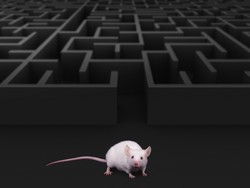Memory biases animal models of depression
Although biomedical research into depression has used animal models for many decades, this approach is now being questioned. Growing evidence has shown inconsistencies between the positive outcomes of some drugs in these models compared to their limited effectiveness on humans. In addition, current animal models for depression and standard animal testing situations can only simulate a few symptoms of the disease. However, a broader set of psychological, neuroanatomical and cognitive changes found in depressed patients need to be considered. The role of cognition, which is recognised as both a potential risk factor and indicator of human affective (emotional) disorders, has also been particularly neglected in animal models. The EU-funded project MEMORAT (Memory bias and affective state: a new cognitive indicator of animal affect) was established to investigate the role of cognitive alterations in memory functioning. The goal was to test the hypothesis that depressed animals, like humans, retrieve negative information from their memory better than positive information. Researchers manipulated the emotional states of laboratory rats by developing a novel behavioural assay, which required very little training by the animals, to investigate affect related biases in distractibility. The assay tested the rats’ tendency to exhibit greater sensitivity to the negative stimuli of a brightly lit area on the ground compared to the positive stimuli of the smell of food, while travelling across a single arm maze. Analyses revealed that rats in a negative affective state demonstrated greater sensitivity to the negative distractor than to the positive distractor. The opposite was true for rats in a comparatively more positive affective state. MEMORAT’s results will have important implications for the use of animal models for testing affective disorder and should provide critical insights for animal welfare science, pain research and psychopharmacology.







